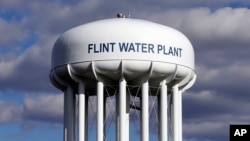The drinking water supply in the city of Flint, Michigan, has fallen below the federal limit for lead content, according to recent tests, and is in line with levels in other U.S. cities.
Flint officials said Tuesday that the lead concentration level was about 12 parts per billion between July and December, marking a sharp drop from the 20 ppb recorded in the prior six-month period.
Federal regulations put the "action level" on lead concentration at 15 ppb.
"This is good news and the result of many partners on the local, county, state and federal levels working together to restore the water quality in the city of Flint," Heidi Grether, state Department of Environmental Quality director, said in a statement.
While the concentration of lead is in line with federal standards, public health officials still warned Flint residents to continue using water filters or bottled water because there could still be disruptions in the water pipeline.
The water crisis in Flint began in 2014 when the city's government switched its water supply from treated water from Detroit to water from the Flint River. The local government failed to properly treat the water lines for corrosion, which led to the elevated lead levels.





